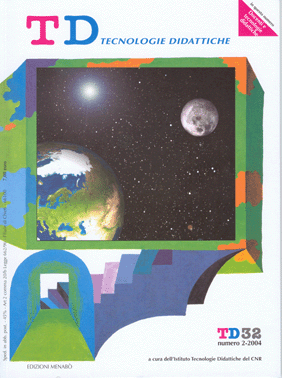Reflecting on AIR
Main Article Content
Abstract
Article Details
Section
Authors who publish with this journal agree to the following terms:
- Authors retain copyright and grant the journal right of first publication with the work simultaneously licensed under a Creative Commons CC BY 4.0 Attribution 4.0 International License.
- Authors are able to enter into separate, additional contractual arrangements for the non-exclusive distribution of the journal's published version of the work (e.g., post it to an institutional repository or publish it in a book), with an acknowledgement of its initial publication in this journal.
- Authors are permitted and encouraged to post their work online (e.g., in institutional repositories or on their website) prior to and during the submission process, as it can lead to productive exchanges, as well as earlier and greater citation of published work (See The Effect of Open Access)
References
Bocconi S., Pozzi F., Repetto M. (2003), Verso lo sviluppo di una comunità di insegnanti pionieri, TD Tecnologie Didattiche, Ed. Menabò, Ortona, n. 30.
Bocconi S., Midoro V., Pozzi F., Repetto M. (2003), AIR guida al corso, rapporto interno ITD 4/03.
Bocconi S., Pozzi F., (2003), AIR guida al formatore, rapporto interno ITD 4/03.
Bocconi S., Midoro V., Sarti L. (1999), Valutazione della qualità nella formazione in rete, TD Tecnologie Didattiche, Ed. Menabò, Ortona, n. 6, pp. 24-40.
Brown J.S., Collins A. & Duguid P. (1989), Situated cognition and culture of learning, Educational Researcher, 18, 1, pp. 32-42.
Cagni G. (2004), AIR in Lombardia, TD Tecnologie Didattiche, n.32, Ed. Menabò, Ortona.
Entwistle N. (1997), Contrasting perspectives on learning, in Marton F. Hounsell D. & Entwistle N. (Eds) (1997) The Experience of Learning, Second Edition, Edinburgh, Scottish Academic Press, Edinburgh, pp. 3-22.
Evans T. & Nation D. (1989), dialogue in the theory, practice and research of distance education, Open Learning, 4 (2), pp. 37-46.
Garrison D.R. (1997), Computer conferencing and distance education: cognitive and social issue, The New Learning Environment: a global perspective, Proceedingsof the ICDE World Conference, Pennsylvania State University.
Henri F. (1992), Computer Conferencing and content Analysis, in Kaye A.R. (Ed), Collaborative Learning Through Computer conferencing: The Najaden Papers, 115- 136,Springer, New York.
Henri F., Charlier B., Daele A. and Pudelko B. (2003), Evaluation for Knowledge, in Davis G.& Stacey E. (eds), Quality education @a Distance, Proceedings of IFIP TC3/WG3.6 working conference, February 3-6, 2003, Geelong, Australia, Kluwer Academic Publishers, Boston.
Jacques D., (1992), Learning in Groups (2nd ed.), Kogan page, London.
Jonassen D. (1999), Designing constructivist learning environments, in Reigeluth C.M.(ed) (1999), Instructional - Design theories and Models, Volume II: a new paradigm of instructional theory, Lawrence Erlbaum, Mahwah, NY.
Laurillard D. (1993), Rethinking University Teaching: a framework for the effective use of educational technology, Routledge, London.
Losito B. (2003), ULEARN - Valutazione del progetto pilota italiano, http:// ulearn.itd.ge.cnr.it/reports/
Losito B. (2004), Ruolo del tutor e qualità della comunicazione, TD Tecnologie Didattiche, n.32, Ed. Menabò, Ortona.
Marton F. Hounsell D. & Entwistle N. (Eds) (1997) The Experience of Learning, Second Edition, Edinburgh, Scottish Academic Press, Edinburgh.
Midoro V. (2004), AIR: Apprendere Insieme in Rete, TD Tecnologie Didattiche, n.32, Ed. Menabò, Ortona.
Morgan A. & Beaty L. (1997), The world of the leaner, in Marton F., Hounsell D. & Entwistle N. (Eds), The Experience of Learning, Second Edition, Edinburgh, Scottish Academic Press.
Muirhead B. (2000), Interactivity in a graduate distance education school, Educational Technology and Society, n. 3, 1.
Oliver R. & Herrington J. (2003), Factors influencing Quality online learning experiencing, in Davis G.& Stacey E. (eds), Quality education @a Distance, Proceedings of IFIP TC3/WG3.6 working conference, February 3-6, 2003, Geelong, Australia, Kluwer Academic Publishers, Boston.
Pozzi F. (2003), La valutazione della partecipazione del corso AIR: software e note, rapporto interno ITD 4/03.
Pozzi F. (2004), Nascita di una comunità di formatori in rete, TD Tecnologie Didattiche, n. 32, Ed. Menabò, Ortona.
Repetto M. (2004), AIR in Liguria, TD Tecnologie Didattiche, n. 32, Ed. Menabò, Ortona.
Savery J., Duffy T. (1995) Problem based learning: an instructional model and its constructivist framework, Educational technology, 35(5):31, 38.
Stacey E. (2000), Quality online participation: estabilishing social presence, Journal of Distance Education, 14 , 2, pp. 14-33.
Scardamalia M. & Bereiter C. (2002), Knowledge building, Encyclopedia of Education, McMillan Reference, NY, USA.
Tannen D. (1994), Talking from 9 to 5: how women‘s and men’s conversational styles affect who gets heard, who gets credit and what gets done at work, William Morrow and Company, New York.
Tesi di Laurea, De Giambattista S., (2003) La valutazione della formazione on line: analisi del progetto AIR, Università Cattolica del Sacro Cuore di Milano, Facoltà di Scienze della Formazione.

